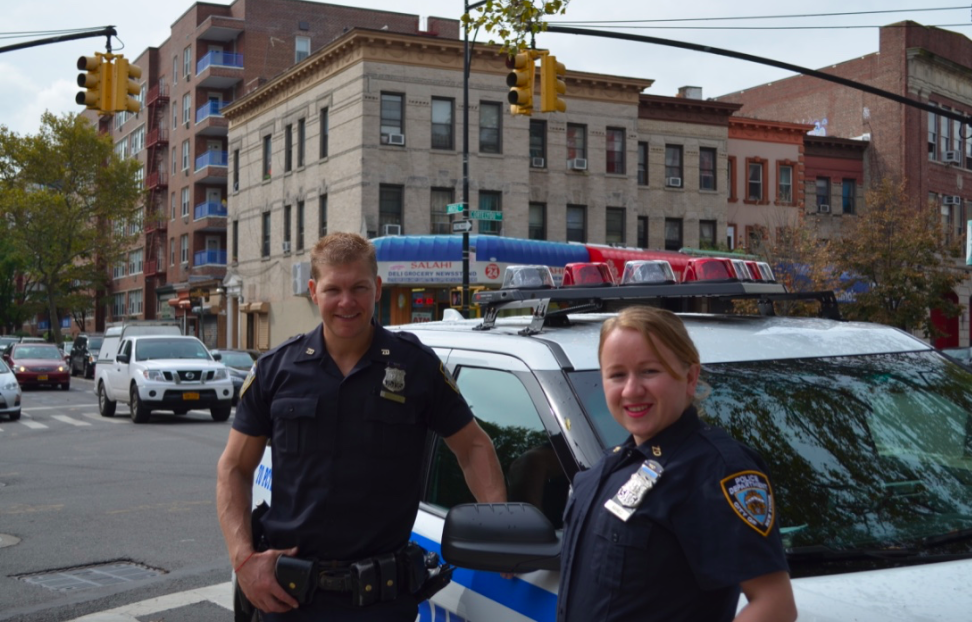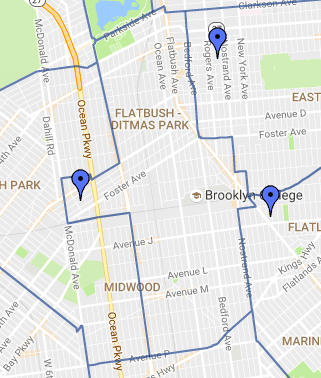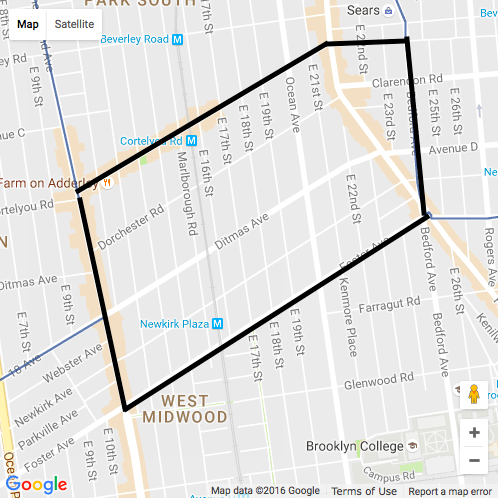Get To Know Two Of Your Local NCOs From the 70th Precinct


This spring, the NYPD launched a neighborhood-based form of policing with the goal of strengthening the relationship between community members and police.
The Neighborhood Coordination Officer (NCO) program, which is being implemented across the city, officially began in the 70th Precinct in March. As part of the program, the 70th Precinct has been divided into four sectors, each of which has two assigned NCOs. The sectors are also policed by patrol officers, who respond to 911 calls.

As NYPD Officer Dilek Kahveci told us, the goal of the NCO program is to “close the gap between the community and the police — to build a bridge.”
Community-oriented policing is not new to the city. “The terms for a [NYPD] ‘Community Police Officer’ have changed many times in the last 20 years,” 70th Precinct Community Council member Nathan Thompson explains in an op-ed he wrote for the Corner this spring.
Most recently, the NYPD had a Community Patrol Officer Program (CPOP), which was dismantled roughly two years ago, Thompson says. CPOP officers in our area played an essential role, he argues, because they got to know one section of the precinct very well, and they were given the time and space to work on issues that were not necessarily tied to a 911 call.
While quite new, the NCO program sounds similar in philosophy.
We’ll be talking to the NCOs from all four sectors in the 70th precinct. Today we’re meeting the two NCOs from sector C, which extends from Cortelyou Road down to Foster Avenue, and Bedford Avenue over to Coney Island Avenue.

NYPD Officer Dilek Kahveci, 29, was born in Turkey and raised in New York City. A Queens resident, she has been on the force for 6 years.
Her partner, Officer Bryan Cipolla, 31, has been on the force for 4 years. Cipolla grew up on Long Island and has lived in other parts of the U.S., but has been living in Brooklyn for the last five years.
As Cipolla explained, the NCOs have three core functions — to work with community members and local institutions like block associations, community boards and houses of worship to address quality of life issues; to carry out regular NYPD enforcement work; and to assist in police investigations pertinent to their sector.
Kahveci and Cipolla aided in the recent investigation, for example, of a series of package thefts from the front porches of area houses. That investigation led to an arrest in April.
Police investigative work — “going after the facts,” Cipolla said, is both “challenging and exciting.”
The NCOs supplement the work of patrol officers, Kahveci and Cipolla said. Twenty-four hours a day, each sector in the 70th Precinct is covered by one to two patrol cars, operating in 8-hour shifts. Those officers are responding to 911 calls. There are also two to three additional patrol cars moving throughout the precinct at any one time, the officers said.
As NCOs, Kahveci and Cipolla spend much of their eight-hour shifts actively reaching out to community members in sector C, trying to learn about problems before they turn into 911 calls. The timing of their shifts varies, the officers said, so they can be more accessible to residents and business owners.
The problems they encounter can range from a car that has been sitting in the same spot for three weeks, to noise complaints, to people loitering in front of buildings and neighborhood disputes.
A key part of the job is tackling chronic 311 complaints, Cipolla said, which patrol officers don’t have the time to do.
Kahveci described a situation in which neighbors on a block in sector C were frustrated with a resident who would gather in the street with 10 to 15 people late at night. Kahveci and Cipolla finally went to the resident’s grandmother to explain the problem. The grandmother assisted in resolving the issue before it escalated, they said.
Part of the job is bringing people together to solve problems, Kahveci said. The sustained presence of NCOs does make a difference she added. “Every day [residents] see the same cops, most people appreciate that.”
“The 70th is a mixed community,” Cipolla added, with several different cultures and nationalities living side by side. “Sometimes it is hard…any time you’re mediating a problem between two people [as the officer], you want to stay neutral. You want both sides to get something out of it and come to a resolution.”
The key challenge for the NCOs, Kahveci and Cipolla said, is to build trust. When residents see them returning to the same blocks every day, some are alarmed and wonder why they keep showing up, Kahveci observed. The objective is to get people to understand that the NCOs are not there to harass community members, they are trying to develop ongoing relationships.
When asked about the 70th precinct’s ongoing drop in major index crimes — 998 this year compared to 1,102 at the same point last year — both Cipolla and Kahveci agreed that more cops on the street was a major contributing factor.
Cipolla and Kahveci both chose the NCO assignment. Now that they are a few months in, they say that they want to stick with it. “It has been a really positive experience,” Cipolla said.
“I love it. It is a big change from patrol work,” Kahveci said. “Every day we meet someone new — we tell them to contact us about non-emergency problems…I just want [people] to approach us…give us a chance…let us know how everything is going.”
To reach your local NCOs, contact the 70th Precinct at (718) 851-5511.



